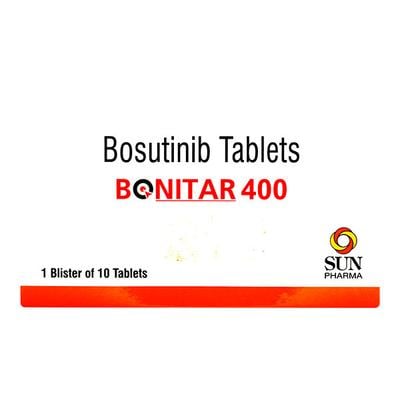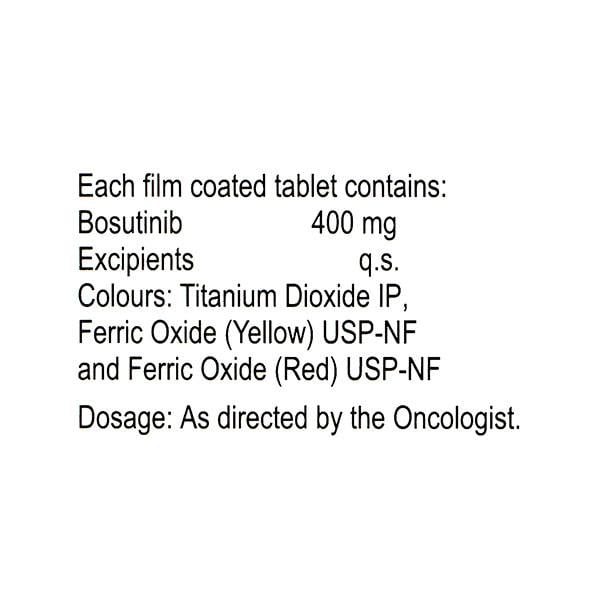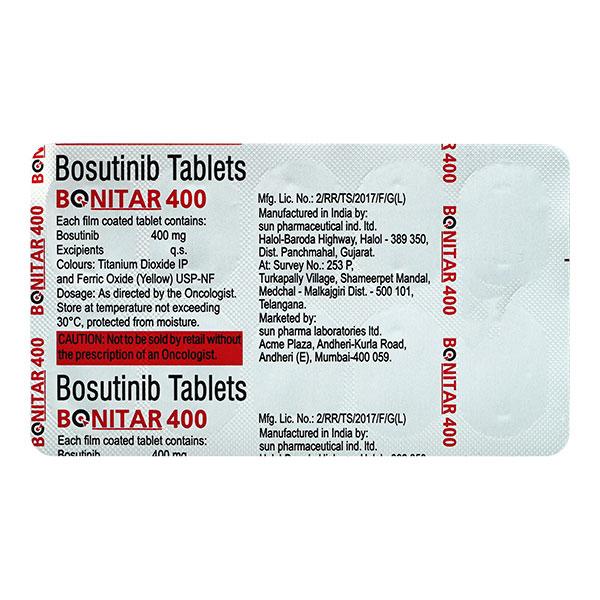

Netmeds First Membership
Introduction About BONITAR 400 TABLET
BONITAR 400 TABLET is an oral targeted therapy used for managing Philadelphia chromosome -positive chronic myeloid leukemia (Ph+ CML) in adult patients. It works by blocking specific proteins called tyrosine kinases, which are responsible for the uncontrolled growth of leukemia cells.
By inhibiting these proteins, bosutinib helps slow or stop the progression of cancer, improving long-term outcomes for patients who may not have responded well to other treatments.
This medication is usually taken once daily with food to enhance absorption and reduce the risk of stomach-related side effects. It is essential to follow the prescribed dosage carefully and attend regular medical check-ups to monitor blood counts, liver function, and overall response to therapy.
Grapefruit and grapefruit juice should be avoided, as they can increase the risk of side effects by affecting how bosutinib is processed in the body.
While BONITAR 400 TABLET is an effective therapy, it can cause side effects such as diarrhea, nausea, liver enzyme abnormalities, and low blood cell counts. Patients should inform their doctor about any existing health conditions, including liver, kidney, or heart problems, to ensure safe use.
Regular monitoring and supportive care can help manage potential side effects, improving the overall treatment experience. Always consult a doctor before starting or stopping bosutinib to ensure it is suitable for your condition.
Uses Of BONITAR 400 TABLET
- Blood Cancer (Ph-positive Chronic Myeloid Leukaemia)
Benefits of BONITAR 400 TABLET
- Helps Control Blood Cancer – Bosutinib is used to manage Philadelphia chromosome-positive (Ph+) CML, a specific type of blood cancer.
- Effective When Other Therapy Don’t Work – It is useful for patients who haven’t responded well to other leukemia medications.
- Convenient Once-Daily Dose – Taken orally as a tablet, making it easier to follow the treatment without hospital visits.
- Specifically Targets Cancer Cells – Unlike general chemotherapy, Bosutinib targets leukemia cells, reducing damage to healthy cells.
- Improves Quality of Life – With proper use, it can help control symptoms, slow cancer progression, and improve overall well-being.
How BONITAR 400 TABLET Works
BONITAR 400 TABLET is a targeted therapy for chronic myeloid leukemia which works by blocking the growth of cancer cells in a specific way.
In people with CML, the body makes too many abnormal white blood cells because of a faulty protein called BCR-ABL kinase. This protein tells the leukemia cells to grow uncontrollably, making it hard for healthy blood cells to function properly.
Bosutinib stops this faulty protein from working, which:
- Slows down or stops the growth of cancer cells
- Allows healthy blood cells to grow normally again
- Helps control the disease and improve symptoms
Unlike traditional chemotherapy, Bosutinib specifically targets leukemia cells and has fewer effects on normal cells, reducing the risk of some side effects.
How to use BONITAR 400 TABLET
Always follow your doctor's instructions regarding bosutinib therapy. Do not adjust the dose or discontinue the medication without consulting your doctor.
How To Take BONITAR 400 TABLET:
- Take bosutinib once daily at the same time each day to maintain consistent blood levels.?
- Always take bosutinib with food to enhance absorption and reduce potential gastrointestinal side effects. ?
- Swallow the tablets whole; do not cut, crush, or chew them.?
Dose Adjustments
- Insufficient Response: If there's no complete hematologic response by week 8 or complete cytogenetic response by week 12, and no severe side effects are present, your doctor may consider increasing the dose to 600 mg once daily.
- Liver Impairment: For patients with liver issues, the recommended starting dose is 200 mg once daily.
- Kidney Impairment: Dose adjustments may be necessary based on kidney function. Consult your healthcare provider for personalized recommendations.
What if I forgot to take BONITAR 400 TABLET
If you miss a dose and it's been more than 12 hours, skip the missed dose and resume your regular dosing schedule the next day. Do not take an extra dose to make up for the missed one.
Side Effects Of BONITAR 400 TABLET
BONITAR 400 TABLET may cause certain side effects in some individuals, although not everybody gets them.
Common Side Effects of BONITAR 400 TABLET:
- Low RBC, WBC or platelet count in blood tests
- Diarrhoea, vomiting, stomach pain, nausea
- Respiratory tract infection
- Nasopharyngitis
- Decrease of appetite
- Joint pain, back pain
- Headache, dizziness
- Skin rash which may be itchy and/or generalised
- Acne
- Cough and shortness of breath
- Fluid in the lungs (pleural effusion)
- Increase in blood pressure
- High potassium levels in the blood
- Low level of phosphorus in the blood
- Excessive loss of body fluid (dehydration)
- Muscle pain
- Changes in taste sensation
- Fluid around the heart (pericardial effusion)
- Ringing in the ears (tinnitus)
- Photosensitivity reaction (sensitivity to UV rays from the sun and other light sources)
When to Seek Medical Attention?
Stop taking BONITAR 400 TABLET and inform your doctor immediately if you experience any of the following side effects:
- Signs of bleeding, fever or easy bruising
- Liver disorders causing itching, yellow eyes or skin, dark urine, and pain or discomfort in the right upper stomach area or fever.
- Stomach/intestinal disorders causing stomach pain, heartburn, diarrhoea, constipation, nausea and vomiting
- Heart problems causing an irregular heart beat while taking Bosutinib.
- Recurrence (reactivation) of hepatitis B infection when you have had hepatitis B in the past (a liver infection).
- Severe skin reactions. Tell your doctor right away if you have any of these symptoms: painful red or purplish rash that spreads and blisters and/or other lesions begin to appear in the mucous membrane (e.g. mouth and lips).
- Respiratory problems
Warning & Precautions
Pregnancy
Contraindicated- Studies have shown that Bosutinib can cause fetal harm when administered to a pregnant woman. Animal studies have shown reproductive toxicities. Therefore, BONITAR 400 TABLET is not recommended for use in pregnant women and in women who think they are pregnant.
- ?Women of reproductive potential should use effective contraception during therapy and for at least two weeks after the last dose. ?
Breastfeeding
Contraindicated- Breastfeeding is not recommended while taking bosutinib and for at least two weeks after the final dose due to potential serious adverse reactions in nursing infants. ?
Driving and Using Machines
Use with Caution- Patients should exercise caution when driving or operating machinery, as bosutinib can cause side effects like dizziness or visual disturbances that may impair the ability to perform these tasks safely.
Alcohol
Consult your doctor- While specific interactions between bosutinib and alcohol are not well-documented, it's advisable to limit alcohol intake. Alcohol can affect liver function, and since bosutinib is metabolized in the liver, concurrent use may increase the risk of liver-related side effects.?
Kidney
Consult your doctor- Bosutinib can cause kidney problems. Therefore, before taking BONITAR 400 TABLET, inform your doctor if you have a history of kidney issues. Regular monitoring of kidney function is recommended during therapy.
Liver
Contraindicated- Patients with liver impairment should not use bosutinib. Liver function tests should be conducted before starting treatment and monitored regularly thereafter.
Allergy
Contraindicated- Do not take BONITAR 400 TABLET if you are allergic to bosutinib or any of its ingredients.
Lungs
Contraindicated- Bosutinib may cause fluid retention, leading to swelling and, in severe cases, fluid accumulation in the lungs (pleural effusion). Therefore, BONITAR 400 TABLET is not recommended for use in patients with lung problems. Report any new or worsening respiratory symptoms to your doctor promptly.
Heart Disease
Use with Caution- Bosutinib has been associated with cardiac events, including arrhythmias and QT interval prolongation. Patients with a history of heart problems should use BONITAR 400 TABLET cautiously and under close medical supervision.
Use In Pediatrics
Consult your doctor- The safety and efficacy of bosutinib in pediatric patients have not been established. Therefore, the use of BONITAR 400 TABLET in individuals under 18 years of age is not recommended.
Use In Geriatrics
Use with Caution- Elderly patients (65 years and older) may experience more frequent adverse reactions. Close monitoring is advised, and dose adjustments may be necessary based on tolerability.
Other Warnings for BONITAR 400 TABLET
Before taking BONITAR 400 TABLET, inform your doctor if you:
- Have diarrhea and vomiting
- Suffer from bleeding problems
- Have any infections
- Have fluid retention
- Have hepatitis B infection
- Have pancreas problems
Drug - Drug interaction
- Antifungal medicines (such as ketoconazole, itraconazole, voriconazole, posaconazole and fluconazole)
- Antibacterial agents (such as clarithromycin, telithromycin, erythromycin, and ciprofloxacin)
- Nefazodone (a medicine used for managing depression)
- Blood pressure lowering agents (such as mibefradil, diltiazem and verapamil)
- Anti-HIV agents (such as ritonavir, lopinavir/ritonavir, indinavir, nelfinavir, saquinavir, atazanavir, amprenavir, fosamprenavir and darunavir)
- Boceprevir and telaprevir (used for hepatitis C infection)
- Aprepitant (a medicine used for nausea)
- Imatinib (used for leukaemia)
- Crizotinib (used for non-small cell lung cancer)
- Rifampicin (used to manage tuberculosis)
- Phenytoin and carbamazepine (used to manage epilepsy)
- Bosentan (used for Pulmonary Artery Hypertension)
- St. John’s Wort (a herbal preparation used to manage depression)
- Modafinil (used to manage certain types of sleep disorders)
- Heart medicines
- Antimalarial agents (such as chloroquine, halofantrine)
- Haloperidol (used to manage psychotic disease such as schizophrenia)
- Domperidone (used to manage nausea and vomiting)
Drug - Food interaction
- Grapefruit and Grapefruit Juice: Avoid consuming grapefruit products while taking bosutinib, as they can increase the risk of side effects.
FAQs About BONITAR 400 TABLET
Q: What is BONITAR 400 TABLET used for?
A: BONITAR 400 TABLET is a targeted therapy used to manage Philadelphia chromosome-positive chronic myeloid leukemia (Ph+ CML) in adults, particularly when other treatments have not been effective or well tolerated.
Q: How does BONITAR 400 TABLET work?
A: BONITAR 400 TABLET blocks certain proteins (tyrosine kinases) that promote the growth of cancer cells, helping to slow or stop the progression of leukemia.
Q: How should I take BONITAR 400 TABLET?
A: Take BONITAR 400 TABLET once daily with food, as prescribed by your doctor. Swallow the tablet whole with water and avoid crushing or breaking it.
Q: What should I avoid while taking BONITAR 400 TABLET?
A: Avoid consuming grapefruit or grapefruit juice, as it can increase the risk of side effects. Inform your doctor about all medications, including herbal supplements, to prevent drug interactions.
Q: What are the common side effects of BONITAR 400 TABLET?
A: Common side effects of BONITAR 400 TABLET include diarrhea, nausea, vomiting, abdominal pain, fatigue, liver enzyme elevation, and low blood cell counts. Drinking plenty of fluids and following your doctor's recommendations can help manage these effects.
Q: Can I take BONITAR 400 TABLET if I have liver or kidney problems?
A: Patients with liver or kidney impairment should use Bosutinib with caution. Dose adjustments or close monitoring may be required to ensure safety.
Q: Is BONITAR 400 TABLET safe during pregnancy or breastfeeding?
A: No, BONITAR 400 TABLET can harm an unborn baby and should not be used during pregnancy. Breastfeeding is also not recommended while taking this medication and for at least two weeks after the last dose.
Q: Can BONITAR 400 TABLET affect my ability to drive or operate machinery?
A: BONITAR 400 TABLET may cause dizziness or vision changes. If you experience these symptoms, avoid driving or operating heavy machinery until you feel safe to do so.
Q: How long should I take BONITAR 400 TABLET?
A: The duration of therapy depends on your response to the medication. Your doctor will determine how long you need to continue taking it based on regular health check-ups and test results.
Q: What should I do if I miss a dose of BONITAR 400 TABLET?
A: If you miss a dose and it's within 12 hours of your usual time, take it with food as soon as you remember. If more than 12 hours have passed, skip the missed dose and continue with your regular schedule. Do not take two doses at once.
References
- Bosutinib. Patient Information Leaflet. Dr. Reddy’s Laboratories (UK) Ltd. EMC. UK. [Revised in January 2024]. [Accessed on 24th March 2025].

- Bosutinib. Macmillian Cancer Support. [Revised in November 2023]. [Accessed on 24th March 2025].

- Bosutinib. Prescribing Information. U.S. Food and Drug Administration. [Revised in September 2012]. [Accessed on 24th March 2025].















